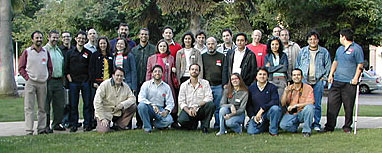This year’s IA Retreat, New Horizons, was quite different from previous versions. First of all, the event was held in a small town typical of Chile’s countryside – yes, in South America! Santa Cruz is a town in the heart of the agricultural valley of Colchagua, which focuses mostly on wine production. We stayed at a very nice hotel, decorated in the colonial style, featuring comfortable rooms and great cooking.
The presentations addressed very well-developed projects and portrayed all sorts of IA implementations and stories from different contexts. The schedule was extensive and intense; you can find the final program and downloadable presentations on the site of the Center for Web Research, the event’s organizers.
 The retreat during a session. / Photo by Javier Velasco
The retreat during a session. / Photo by Javier Velasco
As I was the event’s leading organizer, I’d rather leave more detailed commentary to the other participants. Here are some excerpts from comments that have been published online:
Peter Morville, on the IAI Members list:
One of my favorite things about the IA Institute is the international nature of the membership. Over the past few years, it has been great to meet up with IAs around the world at IAI-sponsored events. The IA Retreat in Chile was no exception. The people were warm, smart, interesting, fun, and very knowledgeable about IA and UX.
From Carolina Leslie’s blog:
The Retreat in Chile was really awesome. Javier managed to gather many great people in an amazing corner of Chile, and the outcome was unavoidably a grand weekend. And, despite the tower of babel formed by the diversity of languages, we were able to communicate very well.
The event had a strong international character, with participants from Chile, Brazil, Uruguay, Panama, Mexico, USA, Canada and Spain, yet it was odd not to find any other Latin American countries such as Argentina or Venezuela.
This sharing with [Information] Architects from other countries showed how the practice of IA is similar in different places. We have many features, problems and challenges in common, and not only with our Latin American colleagues….
(Free translation from Portuguese)
 Peterme blogging on site. / Photo by Javier Velasco
Peterme blogging on site. / Photo by Javier Velasco
From Laura Lessa’s blog:
We found in Chile a community of User Experience professionals –
usability consultants, [information] architects, web producers, teachers
and evaluators – that is expressive, articulated and organized. Starting
with the initiator of the event, Javier Velasco,
to professor Juan Carlos Camus (yes,
he leads an IA course at the Economics School of Universidad de Chile), consultant
Nelson-Rodriguez-Peña and
Jorge Barahona, partner of the
coastal web producer AyerViernes (that’s the name), and grand knower of
wines.
(Free translation from Portuguese)
 At the winery / Photo by Peter Merholz
At the winery / Photo by Peter Merholz
From Gene Smith’s blog:
One of many highlights of the information architecture retreat in Santa Cruz, Chile this weekend was the presentations by Globo, a Brazilian media company.
My favourite was a case study on the design and development of 8P, a photo sharing site that looks like Flickr meets MySpace (but which they describe as Orkut meets Fotolog).
There were a couple of interesting ideas in the presentation. First, Flickr is unappealing to Brazilians because they want to customize the interface to express their individual identities (which partly explains the success of Fotolog in Latin America).
Second, Brazilians’ love of social networking (of the MySpace-Orkut variety) goes well beyond the MySpace generation – someone told a story about how grandmothers are getting online to use Orkut. Maybe it’s the high-context nature of the cultures. As Marcelo noted, Flickr is about the photos while 8P is about the people (and how they want to present their identity).
 Viña Santa Cruz / Photo by Pilar Palacios
Viña Santa Cruz / Photo by Pilar Palacios
From Jorge Arango’s blog:
In previous IA retreats and summits, I felt like a tourist visiting the future from the past – the state of the profession in Panama is such that the stuff usually being discussed in these events is 5-10 years in the future for our market. Because this event was focused on the Latin American markets, the playing field was more even.
In conversations with colleagues from Chile, Brazil, and Uruguay (the three other Latin American countries represented), it became obvious that we face similar challenges – and opportunities. A shared concern seemed to be the way the common perception of IAs as “web designers” can place limits on our scope of action when dealing with business stakeholders.
It was also clear that the profession is in very different stages of development in our various countries. Of the countries represented, Chile is perhaps the most advanced – there is a vibrant community of IAs there, the profession is recognized in the business and academic fields, and, well, they can hold events like this one and get people to show up. I was also told that clients are starting to specifically ask for IA work as part of their web projects. A far cry from Panama!
Brazil doesn’t lag far behind; the Globo.com IA team, for example, seems to enjoy strong corporate support. It’s a relatively large group, and the value of their efforts seems to be recognized by their organization. What seems to be missing, perhaps, is a local sense identity for the profession (e.g. local gatherings). I suspect that this retreat will be the catalyst that will change this. (There is talk already of holding next year’s retreat in Rio!)
From Peterme’s blog:
… We stayed at the Hotel Santa Cruz, an extremely nice hotel, and enjoyed great meals and socializing. As part of the retreat we visited Viña Santa Cruz, a vineyard owned by the hotel, that was something of a wine-making Disneyland — it was clearly designed for tourists (with a restaurant, a gift shop, a funicular to take you up a hill to a plateau with an observatory, a Mapuche house, a Rapa Nui (Easter Island) house and moai, and two llamas for petting. …

New Horizons 2006 Information Architecture Retreat: Group Shot
Photo by Gloria Alcayaga
We hope this brings you a brief idea of what it was like. We’d like to thank
Chile’s Millenium Science Initiative,
Yahoo! Research and The
Information Architecture Institute for help in sponsoring this event.
Multimedia:
Presentation Slides
Available at
the Center for Web Research.
Photos:
Some people said this was the most photographed retreat ever. You can
find many pictures on flickr under the tags iaretreat2006
and chileretreat2006.
Nelson also captured a plenitude of pictures which he was uploading on the fly,
but he doesn’t like flickr so he distributed them along with his
blog postings on the event.
Video:
Sebastián made this
cute video that captures the spirit of the event.

Javier,
In organizing the retreat, did you learn any lessons about things that worked well or that didn’t work at all?
Hi Austin,
I had asked Christina and Anders for some coaching on how to organize this, one of the keys was to try to let the hotel manage as much production as possible. I had the hotel handle the meals, the bus and even the trip to the nearby winery, since they all belong to the same holding.
Most of the things that went wrong or almost wrong were related to the problems of the culture in my country, my largest lesson would be “check everything twice”. Image how you would feel if they tell you the bus that you had reserved months ago is not booked, just the day before departure. Other problems were also related to incompetency by the hotel administration, we had some minor inconveniences in distributing the people in the rooms, and checkout was a pain.
Another thing that I didn’t like all that much was the fact that the presentations were over-developed for the retreat format, it felt more like a regular conference in a retreat disguise, the ideas weren’t really raw. I’d also suggest not to place tables in the room and try to avoid people from opening up their laptops, physical space configuration will have a great impact on the conversation. Lastly, managing the schedule can be a huge challenge, we had to fudge it every hour since there were more people lining up to talk and we didn’t want to leave anyone out.